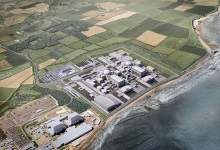

Ever since it was first proposed in October 2013, the proposed deal between the UK government and French nuclear power company EDF for the financing of a new nuclear plant has courted controversy. With the government keen to court private involvement and the developer averse to taking on all the risk, a financial fusion was proposed whereby the government would agree to a fixed rate for each unit of electricity in return for a firm commitment to build and operate from EDF.
Following legal challenges on the grounds that the agreed ‘strike price’ of £92.50 ran counter to state aid regulations, the European Commission was called in to pass judgement on what the balance between private and public money should be.
Finding in favour of the UK Government and EDF, the Commission has granted greater involvement of the public side in the affairs of the private. Outlining a series of modifications to the original proposal, which have already been agreed with the UK government, the commission said "state aid provided will remain proportionate to the objective pursued, avoiding any undue distortions of competition in the Single Market".
The changes include, an increase in the upfront guarantee from EDF that will reduce the taxpayer burden by £1 billion, an increase in the return for the taxpayer by splitting overall profits from the plant once the agreed rate agreed with EDF has been exceeded, and the addition of a new rate of return that if reached will see the taxpayer receive more than half.
Risk and returns raised for taxpayer investment
Is nuclear power and the Hinkley deal the best move for the UK’s future energy strategy?

US Tariffs are shifting - will you react or anticipate?
Don’t let policy changes catch you off guard. Stay proactive with real-time data and expert analysis.
By GlobalDataWhile the Commission announced that the long term return to the state would improve, it also raised the forecast for the initial outlay significantly. Ministers had previously suggested it would cost £16 billion, but the EC expects the total cost to come in at £24.5 billion, with the plant generating electricity from 2023. In addition to Hinckley Point C, the decision is likely to add momentum to the building of a new fleet of plants across the UK and also a wave of state-aid programmes across the EU, particularly with regard to Germany’s plans to significantly boost renewable power generation.
However, the decision by the Commission, which received just one more vote than the required 15, may come under legal scrutiny after it emerged that Austria is considering a legal challenge. The EU member state, which strongly supports the growth of renewables, has threatened to take the matter to the European Court of Justice.
Irrespective of whether the decision draws the issue of Hinckley Point C to a close, it has provoked a strong response from both supporters and opponents to nuclear power generation. Responding to the announcement, Ed Davey, energy and climate change secretary, said: "After a thorough, detailed and independent analysis of our proposed project with EDF, this decision shows the European Commission agrees that this is a good deal for consumers and enables us now to proceed to the next stage."
New wave of nuclear plants split opinion
Welcoming the outcome, Gary Smith, national secretary for Energy at workers’ union GMB, said: "Nuclear new build is crucial to delivering low carbon electricity and keeping the lights on. Our energy infrastructure is creaking and we need to get on with this and building other nuclear power plants as a matter of urgency." He added that any challenge launched by Austria would be driven by "anti-nuclear prejudice".
Calling the decision a ‘world class sell-out’ to the nuclear industry, Greenpeace EU legal adviser Andrea Carta, said: "It’s such a distortion of competition rules that the Commission has left itself exposed to legal challenges. There is absolutely no legal, moral or environmental justification in turning taxes into guaranteed profits for a nuclear power company whose only legacy will be a pile of radioactive waste."
Criticism of the deal includes, the absence of an agreement specifying how EDF will contribute to the disposal and decommissioning costs, ‘insurance’ offered over future environmental law changes, and a state-guarantee to cover the project if it defaults on any loan repayments.


.gif)

